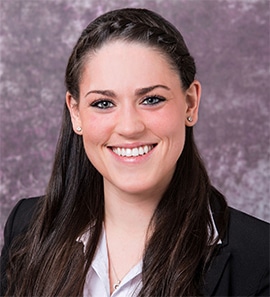
Ashlee Skarzenski | MSN, RN, CPAN, CEN, NE-BC
My Certification Story
This story is not just about how I achieved my CPAN certification, but how the nurses in the PACU at the University of Pittsburgh Medical Center (UPMC) Hamot accomplished our goal of having 100% of our eligible nurses certified. I assumed leadership of the PACU at UPMC Hamot in April 2017. At this time, only 41% of the eligible nurses in the unit were certified. I quickly worked with our Magnet Program Director to develop a pay-ahead program through our hospital. I then met with each staff member to discuss career growth (progression through the clinical ladder, certifications, going back to school, etc.). Any of the nurses who were eligible to test for their CPAN, were encouraged to take the exam and I provided them with the testing deadlines. In summer 2017, I purchased CPAN study materials, such as multiple study books, the ASPAN Perianestheia Nursing Standards Practice Recommendations and Interpretive Statements, and the most recent ASPAN Orientation Guide. In August 2017, I began studying so that I could test myself. I let the staff know my intentions, which motivated some of them to test with me. During this study time, I signed up for the weekly CPAN/CAPA question. I began writing these questions on a whiteboard in our unit to share with the staff members - a practice that one of the nurses has continued to this day. In October 2017, I passed my CPAN exam along with 5 of the PACU staff members. To celebrate CPAN success, I purchased CPAN badge clips. When a nurse became CPAN certified, I would gift them a handwritten thank you card with a CPAN badge clip to show off their huge accomplishment. Also, at the end of the testing period, we would have unit celebrations with cake for the new CPAN nurses. Finally, I purchased a plaque to post the names of our CPAN certified nurses in a central location in the department. In the spring 2018, we were awarded with the ABPANC Certification Achievement Award for having 75% of our eligible staff certified. At that time, we had 6 more staff members who needed to become certified so that we could reach our 100% goal. This really put the pressure on – the nurses who were certified would share study materials, provide encouragement, etc. In this group of 6, there were two nurses who had previously failed the exam and were extremely nervous to test. One of the nurses tested in the Spring, leaving five left. All five registered for the Fall 2018. November 10-15 was a very tense week – all five decided to take their test that week. One passed, the second and third passed. The final two were testing on November 15, the last day of the testing window. Around 1:30, we received word from the fourth that she had passed. And around 2:30, we finally received the phone call that our final nurse had passed! It was such an emotional moment for the entire team!
My Study Strategies
When I studied for the exam, I took every test in the ASPAN Certification Review for Perianesthesia Nursing book. When I took these tests, I would sit down at my desk at home with ear plugs and take the exam just like it was the actual test. I have used this method to study for my previous certification exams and felt like it helped me build a tolerance and train my brain to take long examinations. I also read the newest edition of the ASPAN Orientation Guide. I felt like this was a good overview/refresher of each system. Finally, the week before my exam, I took all 4 of the practice tests that you can purchase through ASPAN. After taking these exams, you are provided a pass/fail score. When I received passing scores on these practice exams, it really helped boost my confidence that I was ready for test day.
My Benefits
Obtaining a professional certification is an outstanding accomplishment! The journey to obtaining the passing score is where the benefit comes from. Studying for a certification forces nurses to do a dive deep into their practice and to gain a full depth of knowledge about things that they normally wouldn't take the time to learn. You become an expert in your specialty and in turn can provide the best possible care to your patients. Finally, having an entire department of certified nurses makes patients feel good about the care they are receiving.
My Advice
Do not give up!! Receiving a failing score on anything is very disheartening. Take some time to clear your head and then form a study plan. When I began studying, I printed a calendar and mapped out everything: which practice tests I was taking, what chapters I was going to read, etc., and when. I made sure that I was learning things at a good pace and was not cramming at the end. I followed through with my plan up until the last day. When you take the practice tests, take them like you are testing. As I mentioned above, it helps you build stamina for taking long exams. Because you stuck to a regimented plan and have completed all that you intended, the night before your test, take the night off. Or if you feel the need to study, just do some light reading. And get a good night's sleep! Your brain will appreciate the rest the day of the test. And finally, on the big day, take the earplugs they offer you, sit down in your chair, take a big deep breath, and have confidence in the fact that you had a good study plan and stuck with it!
